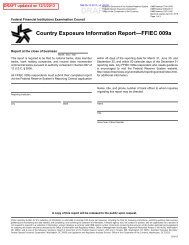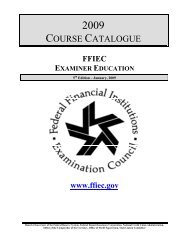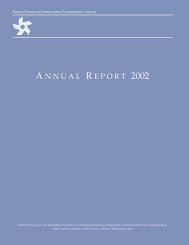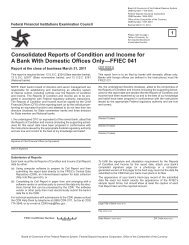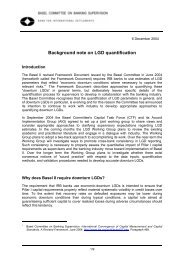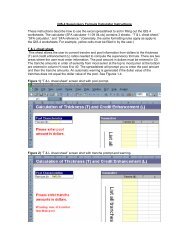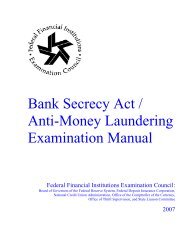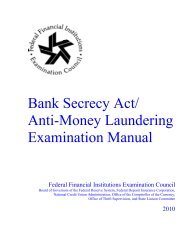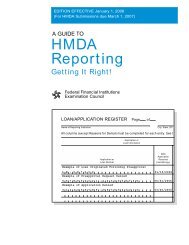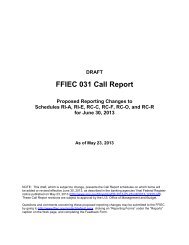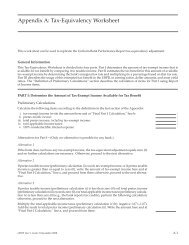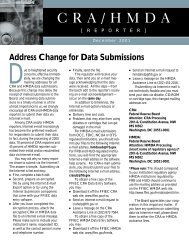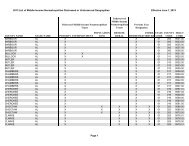FFIEC Annual Report 1999
FFIEC Annual Report 1999
FFIEC Annual Report 1999
Create successful ePaper yourself
Turn your PDF publications into a flip-book with our unique Google optimized e-Paper software.
Task Force on Supervision meeting.<br />
their assistance in identifying the<br />
agencies’ most critical new needs<br />
for supervisory information. From<br />
these ongoing discussions and<br />
from separate efforts to identify<br />
and narrow regulatory reporting<br />
differences among banks, savings<br />
associations, and bank holding companies,<br />
the task force expects to<br />
propose revisions to the existing<br />
bank regulatory reporting requirements<br />
for the Council’s consideration<br />
in the first quarter of 2000.<br />
These reporting changes would be<br />
targeted for implementation in<br />
March 2001.<br />
Finally, on September 3, <strong>1999</strong>, the<br />
three banking agencies requested<br />
public comment on a proposal to<br />
extend their authority under the<br />
Paperwork Reduction Act of 1995 to<br />
collect the Country Exposure <strong>Report</strong><br />
and the Country Exposure Information<br />
<strong>Report</strong> (Forms <strong>FFIEC</strong> 009 and<br />
009a) and to clarify the instructions<br />
that relate to credit derivatives. The<br />
agencies received one comment<br />
letter about the treatment of credit<br />
derivatives. The task force is currently<br />
working with the agencies’<br />
international supervisory staffs to<br />
address the commenter’s recommendations<br />
in order to move forward<br />
with the proposal in the first<br />
quarter of 2000.<br />
Task Force on Supervision<br />
The Task Force on Supervision has<br />
oversight responsibility for matters<br />
relating to the supervision and<br />
examination of depository institutions.<br />
It provides a forum for the<br />
agencies that supervise banks,<br />
thrifts, and credit unions to promote<br />
quality, consistency, and effectiveness<br />
of examination and supervisory<br />
practices and to minimize regulatory<br />
burden. While significant issues<br />
are referred, with recommendations,<br />
to the Council for action, the Council<br />
has delegated to the task force the<br />
authority to make certain decisions<br />
and recommendations, provided<br />
all task force members are in<br />
agreement.<br />
Task force members are the senior<br />
supervisory officials of the constituent<br />
agencies. Meetings are held<br />
regularly to address and resolve<br />
common supervisory issues. The<br />
task force has a standing subcommittee<br />
to address information system<br />
and technology issues as they<br />
relate to financial institution supervision.<br />
Another task force subcommittee<br />
reviews issues pertaining to<br />
regulatory capital. In addition, ad<br />
hoc working groups are created to<br />
handle particular projects and<br />
assignments.<br />
Activities of the Task Force<br />
During <strong>1999</strong>, the task force and its<br />
various ad hoc working groups and<br />
subcommittees were involved in<br />
numerous projects and activities.<br />
Special attention was focused on,<br />
and major accomplishments were<br />
achieved in, matters concerning the<br />
rollover to the Year 2000.<br />
Year 2000 Supervision Program<br />
Throughout <strong>1999</strong>, the <strong>FFIEC</strong> agencies<br />
continued their ongoing efforts<br />
to ensure the readiness of supervised<br />
financial institutions’ automated<br />
information systems, and<br />
those of their customers, for the<br />
century date change. The extensive<br />
final phase of the <strong>FFIEC</strong>’s Year 2000<br />
supervisory program included the<br />
issuance of additional policy guidance,<br />
the conduct of on-site examinations<br />
and intensive monitoring of<br />
financial institutions and markets,<br />
contingency planning to respond to<br />
disruptions or problems that could<br />
occur, and event management for<br />
the year-end rollover period. The<br />
program focused on promoting<br />
industry and consumer awareness;<br />
establishing targets for the completion<br />
of testing, implementation, and<br />
contingency plans; and providing<br />
feedback to institutions, in part<br />
through examinations, regarding<br />
their progress and identification of<br />
outstanding issues.<br />
Policy statements. Through the<br />
<strong>FFIEC</strong>, banking supervisors provided<br />
critical guidance in the form<br />
of periodic policy statements beginning<br />
in 1996. During <strong>1999</strong>, the<br />
<strong>FFIEC</strong> issued statements on customer<br />
communications, including<br />
a consumer checklist on Year 2000<br />
suggestions; business resumption<br />
planning; temporary growth of<br />
assets; fraud prevention; and preservation<br />
of information security.<br />
To better understand the issues that<br />
market participants faced and to<br />
foster more effective communication,<br />
the agencies worked closely<br />
with industry trade groups, including<br />
the Bank Administration Insti-<br />
17



